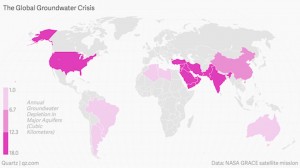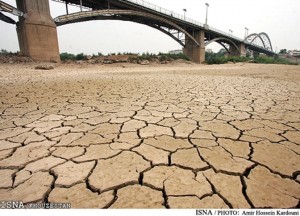Is Water the New Oil?
Nature is cyclical. The Earth was born and it will die, albeit on a different timeframe to human life. Man’s economic systems are also part of the cyclicity of life. But, one of the absurdities of current economic thought is that growth can continue forever. This is hubris, in some areas a downturn has already begun.
The “modern” industrial economy is entirely dependent upon massive and ever increasing supplies of cheap energy. The growth in energy consumption over the past hundred or so years has been paralleled by population growth. The correlation between the two is very high. Thus, we need to take evermore resources from the Earth to support more than seven billion of us.
This massive population is putting a heavy burden on the planet, and particularly on water. The map below shows the rate at which underground aquifers are being drawn down. That is, drawn down in excess of annual recharge. The map was created by NASA using satellite data.
Courtesy NASA Jet Propulsion Laboratory and Russia Times
It is no co-incidence that the troubled Middle East is seeing the greatest rate of water depletion on Earth. Pakistan, India and the US are in a similar position.
The image below shows a dry riverbed in Iran. Many rivers in the country are now dry and several large lakes have disappeared. This is a major issue for Iran and other countries of the Middle East. In fact without huge oil reserves, the area would be largely depopulated.
Courtesy ISNA/Khouzestan and The Daily Impact
China is next in line. A huge population and rapid development have put a major strain on water supplies. Even Brazil, of all places, is using more water than is being replenished.
Here, in Australia, there is usually drought somewhere on the continent. We are saved, to a degree, by our small population. About 25 million in an area similar in size to the continental US.
Water is already a component of wars around the world and things will only get worse without concerted, worldwide action.
Conclusion
So how does this concern the investor?
Water rights can be bought and sold in a number of countries, including Australia. In my opinion, entities with water rights are attractive investments. But there is one very significant risk. Nationalisation of corporately held water rights.
Most people consider water to be a public resource available to all. Further, as water becomes a more critical resource we can expect governments to seek control. Thus the window for profitable water investment may be relatively short.


